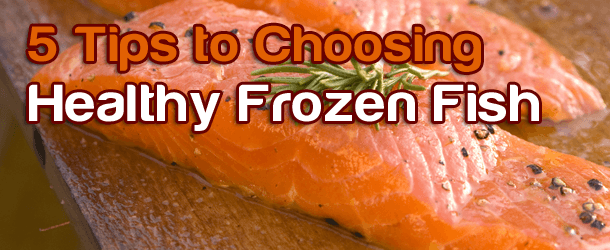
It seems that every major health organization recommends that we eat more fish. It’s a fantastic source of lean protein, packed with vitamins and minerals, and extremely low in fat. The fish that are a bit higher in fat, such as salmon and mackerel contain huge amounts of health-boosting omega-3 fatty acids, however. For that reason, the American Heart Association suggests you put fish on your menu at least twice a week.

While it’s easy enough to buy a pound or two of fresh fish from the supermarket fish counter or your local fishmonger and cook it up, once in a while having someone else do the work is a much-appreciated convenience.
The cost of fresh fish can be steep, and prepackaged fish can often fit into your grocery budget a bit better. But does your health pay a price for all the prep work? We put on our mittens and scoured the frozen fish aisles of the supermarket to find out. Pre-prepped frozen fish is a fantastic base for a quick and healthy meal, as long as you keep these tips in mind:
1. All fish portions are not created equal.
The nutrition information on some frozen fish packages may look too good to be true. That’s because the portion size they refer to may not be much more than a few bites. When you’re comparing fish to fish, be sure you’re comparing adequate portion sizes–roughly three to four ounces (or 85 to 113 grams.)
2. Check the salt.
The benefit of having someone else prepare your fish may come at the cost of a higher sodium content. Read the Nutrition Facts Panel to be sure the fish will fit into your daily sodium limits (shoot for below 2,300 milligrams per day; 1,500 if you’re at risk for hypertension.)
3. Batter beware.
In most cases, batters and breadings add calories, fat and sodium to your fish.
4. Look for omega-3 rich choices.
Many types of seafood contain small amounts of omega-3s that can add up, but try to include omega-3 superstars more often, such as mackerel, lake trout, herring, tuna, salmon, sardines, anchovies, and whitefish.
– Heidi McIndoo, M.S., R.D., Environmental Nutrition
Reprinted with permission from Environmental Nutrition, a monthly publication of Belvoir Media Group, LLC. 800-829-5384.www.EnvironmentalNutrition.com.
(c) 2012 BELVOIR MEDIA GROUP DISTRIBUTED BY TRIBUNE MEDIA SERVICES, INC.

